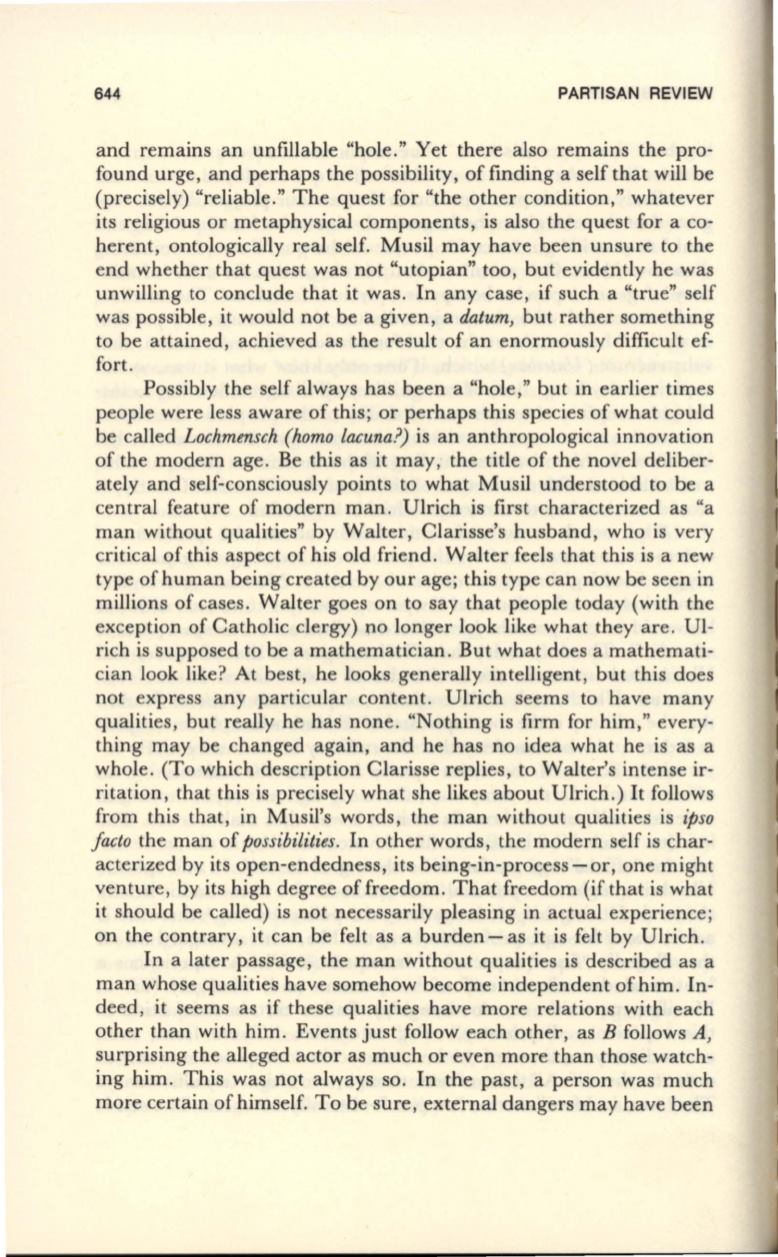
644
PARTISAN REVIEW
and remains an unfillable "hole. " Yet there also remains the pro–
found urge, and perhaps the possibility, of finding a self that will be
(precisely) "reliable." The quest for "the other condition," whatever
its religious or metaphysical components, is also the quest for a co–
herent, ontologically real self. Musil may have been unsure to the
end whether that quest was not "utopian" too, but evidently he was
unwilling to conclude that it was. In any case, if such a "true" self
was possible, it would not be a given, a
datum,
but rather something
to be attained, achieved as the result of an enormously difficult ef–
fort.
Possibly the self always has been a "hole," but in earlier times
people were less aware of this; or perhaps this species of what could
be called
Lochmensch (homo lacuna?)
is an anthropological innovation
of the modern age . Be this as it may, the title of the novel deliber–
ately and self-consciously points to what Musil understood to be a
central feature of modern man. Ulrich is first characterized as "a
man without qualities" by Walter, Clarisse's husband , who is very
critical of this aspect of his old friend. Walter feels that this is a new
type of human being created by our age; this type can now be seen in
millions of cases . Walter goes on to say that people today (with the
exception of Catholic clergy) no longer look like what they are. Ul–
rich is supposed to be a mathematician. But what does a mathemati–
cian look like? At best, he looks generally intelligent, but this does
not express any particular content . Ulrich seems to have many
qualities, but really he has none. "Nothing is firm for him," every–
thing may be changed again, and he has no idea what he is as a
whole . (To which description Clarisse replies, to Walter's intense ir–
ritation, that this is precisely what she likes about Ulrich.) It follows
from this that , in Musil's words, the man without qualities is
ipso
facto
the man of
possibilities.
In other words, the modern self is char–
acterized by its open-endedness, its being-in-process- or, one might
venture, by its high degree offreedom. That freedom (if that is what
it should be called) is not necessarily pleasing in actual experience ;
on the contrary, it can be felt as a burden- as it is felt by Ulrich .
In a later passage, the man without qualities is described as a
man whose qualities have somehow become independent of him. In–
deed, it seems as if these qualities have more relations with each
other than with him. Events just follow each other, as
B
follows
A,
surprising the alleged actor as much or even more than those watch–
ing him. This was not always so. In the past, a person was much
more certain of himself. To be sure, external dangers may have been


